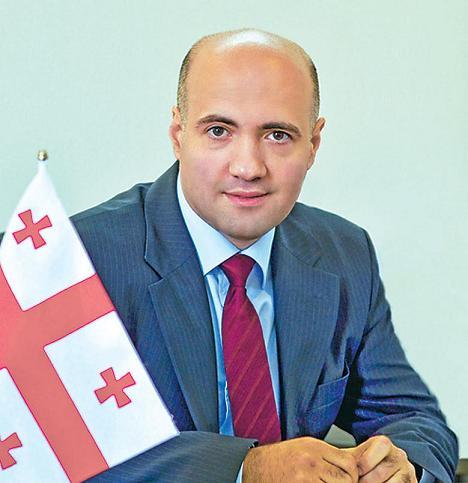Korea’s current economic cooperation with Georgia may be low, but the country’s Finance Minister Dimitri Gvindadze thinks it is about to grow dramatically.
“It is a fast developing cooperation,” he said. “Only this year we opened our embassy in Seoul and we are going to establish business-to-business connections in the first place. I am personally very optimistic because if you look at the key Korean companies they are very busy trying to position themselves globally … I believe that Georgia can be a great partner for the South Korean countries trading in Europe and doing business globally.”
Gvindadze was in Korea last week to speak at the FT Invest in Georgia Forum organized by The Financial Times, after holding the same event in Hong Kong and Shanghai.
“These forums should contribute to the general awareness-raising about Georgia because we started from a pretty low base. You had a dearth of experience and knowledge about what Georgia is because it is far away from here,” he said. “We have been trying to be more concrete in terms of business to business, in terms of reaching out to the individual enterprises.”
“It is a fast developing cooperation,” he said. “Only this year we opened our embassy in Seoul and we are going to establish business-to-business connections in the first place. I am personally very optimistic because if you look at the key Korean companies they are very busy trying to position themselves globally … I believe that Georgia can be a great partner for the South Korean countries trading in Europe and doing business globally.”
Gvindadze was in Korea last week to speak at the FT Invest in Georgia Forum organized by The Financial Times, after holding the same event in Hong Kong and Shanghai.
“These forums should contribute to the general awareness-raising about Georgia because we started from a pretty low base. You had a dearth of experience and knowledge about what Georgia is because it is far away from here,” he said. “We have been trying to be more concrete in terms of business to business, in terms of reaching out to the individual enterprises.”

Georgia has been praised by the World Bank and Transparency international for the dramatic reforms made under President Mikheil Saakashvili since the Rose Revolution of 2003.
Extensive democratic reforms and anti-corruption campaigns are aimed at attracting much-needed foreign investment, especially in the hydropower sector.
The country is now trying to position itself as a regional hub economy as a platform for businesses to serve Georgia as well as crossing borders into the surrounding countries.
The country is in talks with Korean firms about the possible involvement in two mega-hydropower projects.
Korea Electric Power Corporation and SK have already completed a feasibility study for the $800 million Namakhvani cascade project on the Roni River, which has a potential of 450 megawatts, but no Korean firms have yet pledged further involvement in the project.
“When it comes to price, quality, know-how and past experience we know that the Korean companies do have a lot of experience in these areas so we are exploring that in a very proactive manner,” Gvindadze said.
“These are basically the win-win schemes because Georgia uses roughly 18 percent of its overall energy generation capacity, which means there is a huge untapped potential to explore. There are 15 hydropower plants being constructed by the private sector but these are medium-sized power plants. Now with our Korean counterparts we are discussing the bigger schemes which would be worth $600 million to $800 million each.”
He hoped that both mega-power plants would be established by the end of this decade.
As well as energy exports, Georgia is trying to boost trade and aims to conclude a free trade agreement with the Europe Union in 2013.
Georgia was not badly affected by the Eurozone crisis, with a real GDP growth of 7 percent last year and similar growth expected for 2012.
But Gvindadze admitted that “there is a feedback loop in terms of investor and consumer confidence,” and anticipated that continuing Eurozone woes could have an impact.
“But, again, there is a global investor community out there, there are many real-time investors and they are on the lookout for the safe destinations, for countries with a strong sovereign balance sheet in the first place. In my view, Georgia to date comes across as exactly that kind of country,” he added. “For now, the developments and economic strengths of Georgia have got dynamics of their own.”
He said that Georgia was taking an interest in Korea because of the “huge economic leapfrog” it has made in recent years.
“It is a country which is developing fast and becoming increasingly international in terms of its corporate outreach. These companies to a large extent already shape the corporate dynamics in the region but I am sure that the future will be broader than that. These are the companies that will most likely become the global players,” he said.
“South Korea is politically and geopolitically speaking one of the very constructive players on the global and Asian chessboard. The political, economic and business dimensions all factor in our desire to have a very close relationship with this country.”
By Kirsty Taylor (kirstyt@heraldcorp.com)
-
Articles by Korea Herald








![[Today’s K-pop] BTS pop-up event to come to Seoul](http://res.heraldm.com/phpwas/restmb_idxmake.php?idx=644&simg=/content/image/2024/04/17/20240417050734_0.jpg&u=)
![[Graphic News] More Koreans say they plan long-distance trips this year](http://res.heraldm.com/phpwas/restmb_idxmake.php?idx=644&simg=/content/image/2024/04/17/20240417050828_0.gif&u=)







![[KH Explains] Hyundai's full hybrid edge to pay off amid slow transition to pure EVs](http://res.heraldm.com/phpwas/restmb_idxmake.php?idx=652&simg=/content/image/2024/04/18/20240418050645_0.jpg&u=20240419100350)

